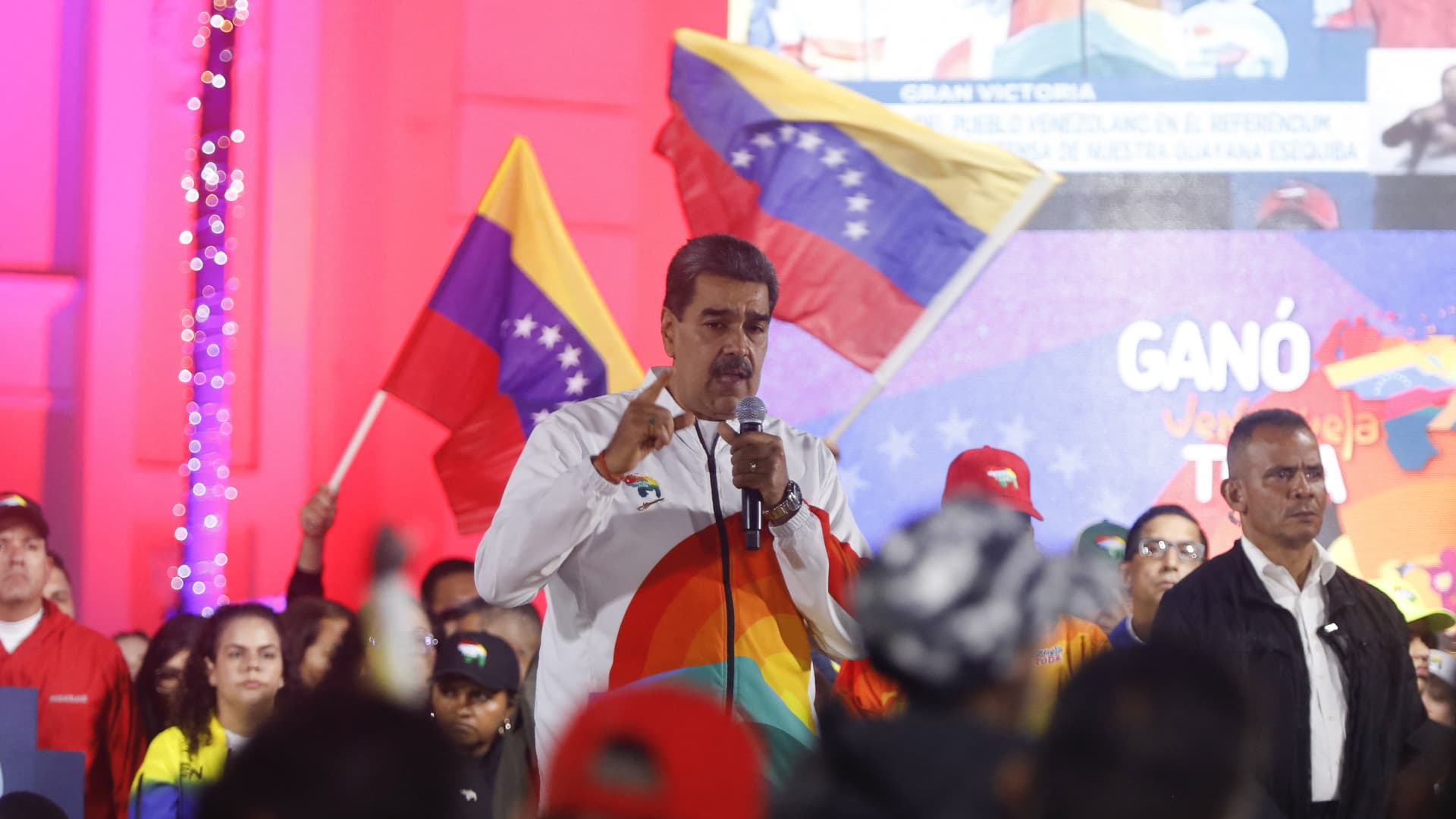It is “an evident and overwhelming victory for the ‘Yes’ in this consultative referendum,” said the president of the National Electoral Council, Elvis Amoroso. (Photo by Pedro Rances Mattey / AFP) (Photo by PEDRO RANCES MATTEY/AFP via Getty Images)
Venezuelans on Sunday voted to claim sovereignty over a large swathe of their oil-rich neighbor Guyana, marking the latest escalation in a long-standing territorial dispute between the countries.
Voters were asked if they supported the establishment of a new state in the contested area, known as the Essequibo. Venezuela’s National Electoral Council counted more than 10.5 million votes, the country’s local media stated. The number of voters were not specified, however, and the Associated Press reported that few voters could be seen at polling sites throughout the voting period.
The 61,600 square-mile Essequibo region makes up two-thirds of Guyana, and holds enormous oil reserves off its coast.
Friction between both countries has flared since 2015 following oil exploration operations by companies like ExxonMobil. Venezuela believes that Guyana has no right to grant oil concessions in the maritime areas off the disputed territory. Venezuelan President Nicolas Maduro’s government is also facing international pressure to facilitate free and fair elections in 2024.
The dispute over Essequibo is more than a century old. In 1899, an international arbitral tribunal awarded the territory to Britain, when Guyana was still under its colonial rule. Venezuela has since actively disputed this. Maduro in November accused Guyana, the U.S. and oil firms of robbing Venezuela of its territory through “legal colonialism.”
Guyana has maintained that the accord is legal and binding, and in 2018 had sought the International Court of Justice to rule it as such.
Other questions in the referendum included whether or not to grant citizenship to current and future residents in the region, as well as whether there should be a rejection of the ICJ’s jurisdiction over the territorial dispute between both countries. It remains unclear how Maduro’s government will enforce the results.
Markets haven’t really reacted to the planned referendum yet as there has been no physical supply disruption. This also seems unlikely for now.Henning GloysteinEurasia Group Director
“I want to assure Guyanese there is nothing to fear over the next number of hours, days, months ahead,” Guyanese President Irfaan Ali said in a televised statement aired on local media.
“Of course, our vigilance will be enhanced, but we are working around the clock to ensure that our borders remain intact and the people in our country remain safe,” he added.
On Friday, the ICJ ordered Venezuela to refrain from making any move that would change Guyana’s control over Essequibo.

“Venezuela shall refrain from taking any action which would modify the situation that currently prevails in the territory in dispute, whereby the Co-operative Republic of Guyana administers and exercises control over that area,” the ICJ’s statement said.
Both Venezuela and Guyana are critical oil hotspots. Venezuela is the 10th largest producer in OPEC. And the Stabroek Block in Guyanese waters is estimated to hold about 11 billion barrels of oil.
Market impact
U.S. West Texas Intermediate futures traded 0.4% lower at $73.76 a barrel Monday at roughly 7 a.m. ET time, while global benchmark Brent futures stood 0.4% lower at $78.56 per barrel.
“Markets haven’t really reacted to the planned referendum yet as there has been no physical supply disruption. This also seems unlikely for now,” Eurasia Group’s Director Henning Gloystein told CNBC via email.
However, Venezuela’s actions are unlikely to help it improve relations with the U.S., which it needs to improve its own oil production, he added.
The U.S. imposed oil export sanctions against Venezuela in 2019 to punish Maduro’s government following 2018’s elections which Washington considered a sham.
Dan Yergin, vice chairman of S&P Global, told CNBC’s “Street Signs Asia” that the “absurd referendum” is one risk that current crude markets have yet to price in.
Yergin expects that the U.S. government will defend Guyana if Venezuela attacked the country — “it would be like [Russian President Vladimir] Putin going into Ukraine.”
